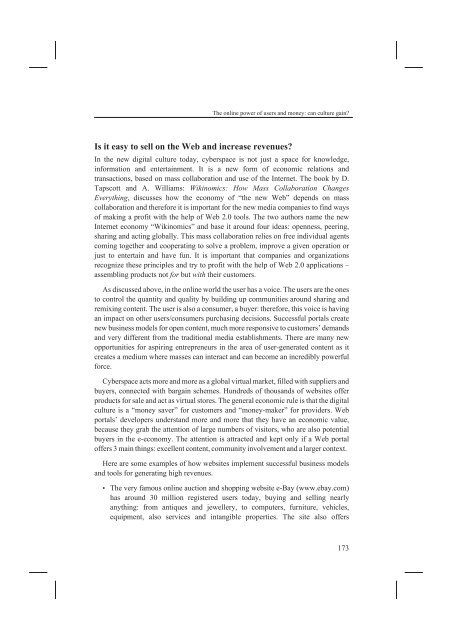D:\Documents and Settings\Ana\My Documents\Biserka-knjiga ...
D:\Documents and Settings\Ana\My Documents\Biserka-knjiga ...
D:\Documents and Settings\Ana\My Documents\Biserka-knjiga ...
You also want an ePaper? Increase the reach of your titles
YUMPU automatically turns print PDFs into web optimized ePapers that Google loves.
The online power of users <strong>and</strong> money: can culture gain?<br />
Is it easy to sell on the Web <strong>and</strong> increase revenues?<br />
In the new digital culture today, cyberspace is not just a space for knowledge,<br />
information <strong>and</strong> entertainment. It is a new form of economic relations <strong>and</strong><br />
transactions, based on mass collaboration <strong>and</strong> use of the Internet. The book by D.<br />
Tapscott <strong>and</strong> A. Williams: Wikinomics: How Mass Collaboration Changes<br />
Everything, discusses how the economy of “the new Web” depends on mass<br />
collaboration <strong>and</strong> therefore it is important for the new media companies to find ways<br />
of making a profit with the help of Web 2.0 tools. The two authors name the new<br />
Internet economy “Wikinomics” <strong>and</strong> base it around four ideas: openness, peering,<br />
sharing <strong>and</strong> acting globally. This mass collaboration relies on free individual agents<br />
coming together <strong>and</strong> cooperating to solve a problem, improve a given operation or<br />
just to entertain <strong>and</strong> have fun. It is important that companies <strong>and</strong> organizations<br />
recognize these principles <strong>and</strong> try to profit with the help of Web 2.0 applications –<br />
assembling products not for but with their customers.<br />
As discussed above, in the online world the user has a voice. The users are the ones<br />
to control the quantity <strong>and</strong> quality by building up communities around sharing <strong>and</strong><br />
remixing content. The user is also a consumer, a buyer: therefore, this voice is having<br />
an impact on other users/consumers purchasing decisions. Successful portals create<br />
new business models for open content, much more responsive to customers’ dem<strong>and</strong>s<br />
<strong>and</strong> very different from the traditional media establishments. There are many new<br />
opportunities for aspiring entrepreneurs in the area of user-generated content as it<br />
creates a medium where masses can interact <strong>and</strong> can become an incredibly powerful<br />
force.<br />
Cyberspace acts more <strong>and</strong> more as a global virtual market, filled with suppliers <strong>and</strong><br />
buyers, connected with bargain schemes. Hundreds of thous<strong>and</strong>s of websites offer<br />
products for sale <strong>and</strong> act as virtual stores. The general economic rule is that the digital<br />
culture is a “money saver” for customers <strong>and</strong> “money-maker” for providers. Web<br />
portals’ developers underst<strong>and</strong> more <strong>and</strong> more that they have an economic value,<br />
because they grab the attention of large numbers of visitors, who are also potential<br />
buyers in the e-economy. The attention is attracted <strong>and</strong> kept only if a Web portal<br />
offers 3 main things: excellent content, community involvement <strong>and</strong> a larger context.<br />
Here are some examples of how websites implement successful business models<br />
<strong>and</strong> tools for generating high revenues.<br />
• The very famous online auction <strong>and</strong> shopping website e-Bay (www.ebay.com)<br />
has around 30 million registered users today, buying <strong>and</strong> selling nearly<br />
anything: from antiques <strong>and</strong> jewellery, to computers, furniture, vehicles,<br />
equipment, also services <strong>and</strong> intangible properties. The site also offers<br />
173



